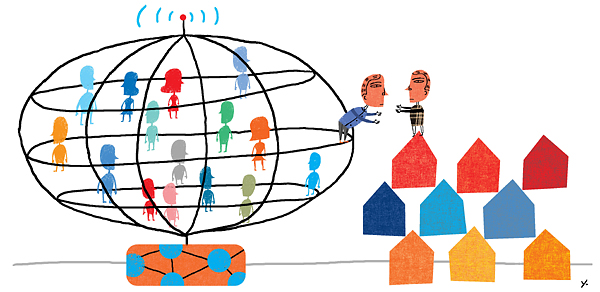
1) Stephen Marche is certainly making a name for himself as the technological doomster, and in a supremely convincing way. He’s the one that wrote that piece we completely over-covered, called “Is Facebook Making Us Lonely?” and then there was that piece on our modern muse, Failure, and right in time for Ash Wednesday, we have “The Epidemic of Facelessness,” an op-ed piece which appeared in this Sunday’s Times. Marche talks in great detail about an age where, in most part, the majority of our social interaction takes place online and on screen. One of the consequences of this impersonal way of connecting, beyond the sheer weirdness of it all, is the distance we now feel between our virtual lives and our real lives, the opinions we withhold in everyday conversation and the ones we unleash on our Facebook pages. Marche describes the fact that rage has become the predictable standard online, with trolls and comment threads spilling unbelievable amounts of vitriol on nearly every post, on nearly every site. And yet, offenders are often surprised when their internet selves have gotten their real selves in real trouble.
When the police come to the doors of the young men and women who send notes telling strangers that they want to rape them, they and their parents are almost always shocked, genuinely surprised that anyone would take what they said seriously, that anyone would take anything said online seriously. There is a vast dissonance between virtual communication and an actual police officer at the door. It is a dissonance we are all running up against more and more, the dissonance between the world of faces and the world without faces. And the world without faces is coming to dominate.
Recently Dick Costolo, chief executive of Twitter, lamented his company’s failures to deal with the trolls that infested it: “I’m frankly ashamed of how poorly we’ve dealt with this issue during my tenure as CEO,” he said in a leaked memo. It’s commendable of him to admit the torrents of abuse, but it’s also no mere technical error on the part of Twitter; faceless rage is inherent to its technology.
It’s not Twitter’s fault that human beings use it. But the faceless communication social media creates, the linked distances between people, both provokes and mitigates the inherent capacity for monstrosity.
The “inherent capacity for monstrosity” is called something else in Christianity, and it ain’t just limited to Twitter feeds, but you get the gist: this is the real reason we celebrate Ash Wednesday—a holy day our “real selves” would more often than not choose to forget. It is the day we look deep into our own capacities, given the freedom of facelessness, and it’s not pretty. There are more trolls than police know what to do with, and this environment of interaction prohibits our understanding of each other:
The connection goes the other way, too. Inability to see a face is, in the most direct way, inability to recognize shared humanity with another… Without a face, the self can form only with the rejection of all otherness, with a generalized, all-purpose contempt — a contempt that is so vacuous because it is so vague, and so ferocious because it is so vacuous. A world stripped of faces is a world stripped, not merely of ethics, but of the biological and cultural foundations of ethics.
Marche argues, in the case of trolls, that compassion and empathy is the answer. In an Ash Wednesday understanding of humans who are sinful and will someday die, there is the starting place for forgiveness, and a common starting point for “monsters and victims alike.”
2) Speaking of the Lent, some humorous—if not completely contradictory—renderings of the season. This one, from Inc. magazine, shows you three entrepreneurs who have used Lent in their “highly effective” business strategies. Nothing says “Remember thou art dust” like a self-denial season built on self-improvement. Some gems in here (ht SY):
Taking it one step further, Ceniccola notes that she chose to be an entrepreneur precisely because it allowed her to be the boss, and to be in control. It’s all the more reason she appreciates the tests on self-control that Lent’s practices can provide.
Another entrepreneur who believes his Lent practices have put him in a better spiritual place is Andrew Weyrich, CEO of Weyrich Enterprises. One of the many businesses Weyrich has founded is the “Sinner2Saint” app, which people can use during Lent (and which Weyrich, 38, calls “the first personal trainer for the soul.”)… Still, Lent is the season for trying–and for recognizing that the path to self-improvement is lifelong, season after season and year after year.
Along these lines, many of us will gird up our grocery lists until Easter, either trying meat-free Fridays or alcohol-free weekdays, or, you know, GMO-free mac-n-cheese. The Food Purity Laws seriously seem to be as alive as ever, a la Food Babe.
3) Some baseball news. A-Rod’s handwritten apology to Yankees fans was not exactly the kind of penitence New York was looking for, which is just an unforgiving reminder that apologies, handwritten or no, are acceptable in the world of sports only upon a change in performance. Anytime anyone has fallen from grace with a sports franchise, his or her only chance at “redemption” is an all-star comeback. At such a late stage in his career, the odds are stacked against “A-Fraud”, but the Atlantic notes that he’s also fighting an idea of himself that’s always been hard for fans to trust (ht WTH).
Yet the handwritten note is significant, in that it is clearly aimed at capturing the one thing Rodriguez has always sought but never come close to attaining: authenticity. The “A-Fraud” signs that have dotted the stands in recent years refer most directly to his use of performance-enhancing-drugs, but they also speak to an aura of insincerity that has long clung to Rodriguez, the sense that’s been been more a persona than a person. (Aside from the PEDs, this was best exemplified when he submitted to a photo shoot in Details that showed him kissing an image of himself in the mirror.)
Also, today, Major League Baseball added the equivalent of a shot clock! Sadly, one of the sports that stood outside of time is now enforcing “pace of game” programs, which will make batters stand inside the batter’s box between pitches, giving pitchers only so much time between innings to warm up. There will now be a timer behind home plate. The game which always seemed to me to be a challenge to the modern sports obsession with big scores and little waiting is slowly becoming more palatable.
4) This is really funny (ht BJ): Quiz: North Korean Slogan or TED Talk Soundbyte?
5) Despite research to the contrary, elementary schools still believe in the power of shame and competition to increase classroom learning. This article at ConversationEd looks at the phenomenon of the reading growth chart, a customary growth marker for teachers to hang in classrooms (I’m embarrassed to say I had one up when I was a teacher), but one that conflates student “investment” and deflates student dignity. These kinds of data walls, Kathleen Jasper notes, distinguishes at a very early age the concept of winners and losers, in a setting where it should not be so (ht MG):
I tell my students, who are future teachers in the college of education, this story in hopes they will never use this practice in their own classrooms. It never fails; every semester a few of my undergrads raise their hands to tell me their own shame story about being a loser, their failure displayed on an orange frog or red bear or short line on a giant bulletin board for the whole school to see.
It doesn’t take a PhD in early learning to know data walls and reading competitions are bad because they make winners and losers out of students. Yet, if you Google making reading a competition, you’ll find an infinite amount of products, technology and organizations dedicated to reading battles.
Districts buy these programs even though the research shows, time and time again, making reading a competition has negative affects on student learning:
-Making reading a competition can have lasting negative effects on how a student sees him or herself as a reader. “The motivational outcomes of literacy tasks influence how students interpret their roles in learning to read. Those interpretations can affect their desire to persist and to remain involved in literacy” (Turner & Paris, 1995, p. 671).
-Studies have shown that feelings of self-worth become dependent on external sources of evaluation as a result of competition. Children succeed in spite of competition, not because of it (Kohn, 2009).
Losing is actually really important in learning, because vulnerability and failure is where a lot of important discovery happens. However, students should have the opportunity to feel vulnerable and be a loser on their own terms and not have their failures displayed on a wall in the school.
That’s it for this week! Oh, and if you’re in Texas this March, we’ll be in Tyler! Come one, come all. March 26-27. We’re really excited for what’s lined up there (the schedule is up!)

COMMENTS
One response to “Another Week Ends: Facelessness, Lent CEOs, Literacy Losers, Baseball Clocks, and North Korean Inspiration”
Leave a Reply
















Alex Rodriguez is quite the interesting character, and as a Red Sox fan I should hate him but my feelings have always been more in the direction of feeling sorry for him, in that he is so obviously not at peace with himself, and so correspondingly awkward in his yearning for some sort of public approval. It seems tragic, in the Greek sense, that he now must finish his career with this millstone of PED-related opprobrium around his neck. As we Mockingbirders know, fallen humans love nothing more than the opportunity to condemn one who has formerly been in high places, and when the offense is something so universally taken as a crime against competition, goodness, and the children of America, how loud the outcry will be. I will probably end up being a fan. And in closing, surely I am not the only one who sees in the famous “kiss” photograph a picture of a person who is repelled by seeing himself too closely? Only a person with quite a bit of self-knowledge of the ironies and multiple interpretations available, and an irresistible urge to do some garment-rending, would have allowed that photo shoot to happen. Very Oscar Wilde.